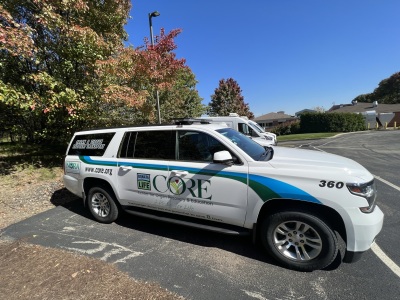Pro-life activists demand investigation into why organ harvesting company was at Planned Parenthood

Pro-life groups are calling for an investigation into why a man was seen leaving a Planned Parenthood clinic carrying bags that he then placed inside a cooler and drove off in a car that displayed the logo of an organ harvesting company with ties to the University of Pittsburgh.
Katie O’Brien, a pro-life advocate with 40 Days for Life Pittsburgh and Sidewalk Advocates for Life of Pittsburgh, shared a video on social media showing a masked man opening the back passenger door of a car sporting the logo for the Center for Organ Recovery and Education (CORE) parked in the driveway of a Pittsburgh Planned Parenthood facility on Oct. 5.
The driver for the organ procurement company appeared to be carrying small bags from the abortion clinic and storing them in a cooler inside the car, according to O'Brien. The pro-life advocate said that the words "organ recovery" caught her attention and prompted her to start filming.
In a statement to The Christian Post, O’Brien said she tried asking the driver about the content in the bags, but he either ignored her or didn’t hear her. The 40 Days for Life member said that while she didn't get a good look at what was inside the bags, they seemed to be filled with paper and possibly something much more valuable to the organ harvesting company. “It seemed like there was something else inside because when he dropped the one bag on the ground, it didn’t fall like a bag containing only a piece of paper would fall,” she added. “It seemed odd that he came out with a handful of Ziplock bags and put them in the cooler rather than just taking the cooler into the facility.”
It is legal to use fetal tissue derived from elective abortions for research purposes under Pennsylvania law. However, a mother must provide written consent, which is only valid if given after she has decided to have an abortion. All persons involved in procuring, receiving, or transplanting fetal tissue must be informed ahead of time about how it was obtained.
CORE assists institutions such as the University of Pittsburgh by providing organs, tissue, and eyes supplied by their donors for research projects.
In a statement to CP, however, CORE insists that despite its logo being displayed on the vehicle, the man seen leaving the Planned Parenthood clinic carrying a bag he then placed inside a cooler was not one of its employees.
"The vehicle pictured is not a CORE vehicle. The person pictured is not a CORE employee or contractor and is not working on behalf of CORE in this image," a CORE spokesperson said in a statement to CP.
"Therefore, CORE cannot speculate why this vehicle was parked in this location nor what its driver was doing or carrying in the photos in question."
The organization also shared photos of its vehicles with CP.

The spokesperson for CORE said in the statement that the organization has never, in its 40 years of operation, “facilitated the donation or recovery of human fetal tissue for transplantation or research after an induced abortion.”
O'Brien wondered why Planned Parenthood provided the man with what she assumed were fetal specimens and did not try to remove him from the property.
"So the only logical explanation is that CORE is lying," she said in a follow-up statement to CP. "And given that they're an organ procurement organization, the only reason that I can come up with for them to be at an abortion facility would be to procure fetal organs."
Dr. David Prentice, vice president and research director at the Charlotte Lozier Institute, acknowledged that while it's difficult to determine the content of the bags, what is known is that the University of Pittsburgh performs fetal tissue research.
"It just behooves them to come clean and be transparent about where all of this fetal tissue is coming from," Prentice told CP. "It's not clear from the photos what's there. But again, the onus is really on the University of Pittsburgh to be transparent in terms of not just this incident but all of their sources of fetal tissue."
A spokesperson for the University of Pittsburgh told CP that the university "has no involvement with or information pertaining to this matter."
"And as further background: Pitt does not have any arrangement whatsoever with Planned Parenthood of Western Pennsylvania, which has also been confirmed by an independent evaluation," the spokesperson added in an emailed response.
A 2021 investigation into the university’s handling of fetal tissue conducted by the Washington, D.C.-based law firm Hyman, Phelps & McNamara reported that Planned Parenthood of Western Pennsylvania doesn’t collect fetal tissue for research purposes.
If the review board approves a project, a researcher may request fetal tissue from the Pitt Biospecimen Core (PBC), according to the report. PBC is an entity that works with the University of Pittsburgh Medical Center (UPMC) to procure fetal tissue from patients who had an abortion or experienced a stillbirth or miscarriage.
The report also stated that the University of Pittsburgh is “fully compliant with federal and state regulatory requirements” regarding fetal tissue research.
Prentice, however, noted that not only did the university choose the law firm that conducted the report, but investigators also did not examine a potential relationship between Planned Parenthood and abortion clinics outside UPMC.
The pro-life researcher also pointed out that about a year ago, the university requested public relations help from the National Institutes of Health (NIH) due to negative press coverage surrounding an experiment that involved transplanting fetal body parts onto rodents.
“There’s just a whole cloud around their whole operation,” Prentice said, adding that it's not only clinics that suffer from a lack of transparency when it comes to fetal tissue, but the receivers do as well.
“Some use middleman companies, tissue processors that collect the tissue and send it on to the researchers. And there is, again, not a lot of transparency about that.”
“There’s still something like $80 million in federal taxpayer dollars going to fetal tissue research in the current fiscal year,” he explained. “And that tissue comes from somewhere.”
Prentice contends that fetal tissue research is “antiquated science” that should be prohibited in favor of ethical research alternatives, such as adult stem cell research. The Charlotte Lozier Institute documented this form of research in a November 2017 report, stating that over 1 million patients worldwide have already benefited from adult stem cell research, according to data gathered in December 2012.
He contended that even though procuring fetal tissue for experiments from elective abortions is legal in Pennsylvania, that does not make it "ethical" or "good science."
"Under current federal and state statutes, collecting fetal tissue for research is not illegal, but it is supposed to be done in strict accordance with the laws and in full transparency, including full informed consent, and no payments for fetal tissue acquired," Prentice wrote, citing Pennsylvania Title 18, Chapter 32, § 3216.
The Center for Medical Progress also believes that O'Brien's footage raises questions about how the university procures fetal tissue. In 2015, the group released a series of undercover videos alleging that Planned Parenthood illegally traffics the bodies of aborted fetuses and that Planned Parenthood of Western Pennsylvania supplies the University of Pennsylvania with fetal tissue in exchange for sponsorship of its operations.
“The University of Pittsburgh swore under oath that it did not harvest fetal organs from Planned Parenthood — so what is the university’s organ harvesting company doing parked at the Planned Parenthood abortion clinic with coolers?” David Daleiden, the founder of CMP, inquired.
CMP has also voiced concerns about Planned Parenthood’s level of involvement with the university’s fetal tissue experiments. Dr. Beatrice Chen, Planned Parenthood of Western Pennsylvania’s medical director, is the vice-chair of the university’s Institutional Review Board, which oversees the university’s research projects.
“The lies from Pitt and Planned Parenthood must stop now and elected officials in Pennsylvania must demand the truth,” Daleiden said.
Samantha Kamman is a reporter for The Christian Post. She can be reached at: samantha.kamman@christianpost.com.





























